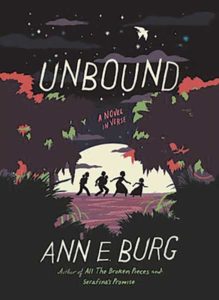Unbound: A Novel in Verse
Reviewed by Judith Favor
May 1, 2017
 By Ann E. Burg. Scholastic Press, 2016. 345 pages. $16.99/hardcover; $10.99/eBook. Recommended for ages 9–12.
By Ann E. Burg. Scholastic Press, 2016. 345 pages. $16.99/hardcover; $10.99/eBook. Recommended for ages 9–12.
Buy from QuakerBooks
If you’re looking for a good book to replenish your spiritual and political imagination, I recommend Unbound. Ann E. Burg relates the harrowing tale of a North Carolina slave family forced to risk everything for freedom. She writes the historic story in verse, told through the voice of the blue-eyed, brown-skinned Grace. The nine-year-old is yanked from her field slave home to serve Master and Missus in the Big House. As the girl learns to chop, churn, and clean, she listens to her inner voice:
I got more thoughts
tumbling in my head’n
a mind can hold.
. . . . . . . . . . . . .
How can the Missus
be so mean?
Adults warn Grace to keep her thoughts private, but the “rightiness” in her head clamors to be heard. Grace is “too haughty” for the Missus, and she learns of the plan to harm her family in order to “put her in her place.” Grace urges her family to flee the plantation, and they do, braving mean paddy rollers, deadly snakes and gators, sucking ooze, and the uncertainty of ever finding freedom in the Great Dismal Swamp.
There is a lot to learn about the Quakerly vocation from Burg’s poetic vocation. She conveys something mighty and ineffable in the unheard voices of slaves faced with raw realities. There is plenty of white space on the pages of Unbound, as if Burg touched the edges of the printed word, found its limits, and gave breathing room for the Spirit, aware that even poetic language cannot do everything. In a September 2016 article in Smithsonian, we hear from archaeologist Dan Sayers, who has studied the runaway slave communities of the Great Dismal Swamp: “Historians have shown a racial bias, a reluctance to acknowledge the strength of black resistance and initiative.” Quakers tend to valorize white leadership in the abolition and Underground Railroad movements with scant acknowledgement of black ingenuity and resilience, leading me to wonder if some educators within the Religious Society of Friends also harbor a racial bias.
Burg, a retired middle school teacher, carefully researched the people known as “maroons” (from the Spanish cimarrón meaning “wild” or “untamed”), wilderness runaways who formed secret settlements on the border of the swamp or in a more secluded area of the interior. Archaeologists in North Carolina today are busy reading their brave, defiant stories buried in the soil of remote islands within the Great Dismal Swamp. To increase our understanding of resourceful hinterland maroons, Friends of all ages might want to get busy reading Unbound: A Novel in Verse.



Comments on Friendsjournal.org may be used in the Forum of the print magazine and may be edited for length and clarity.